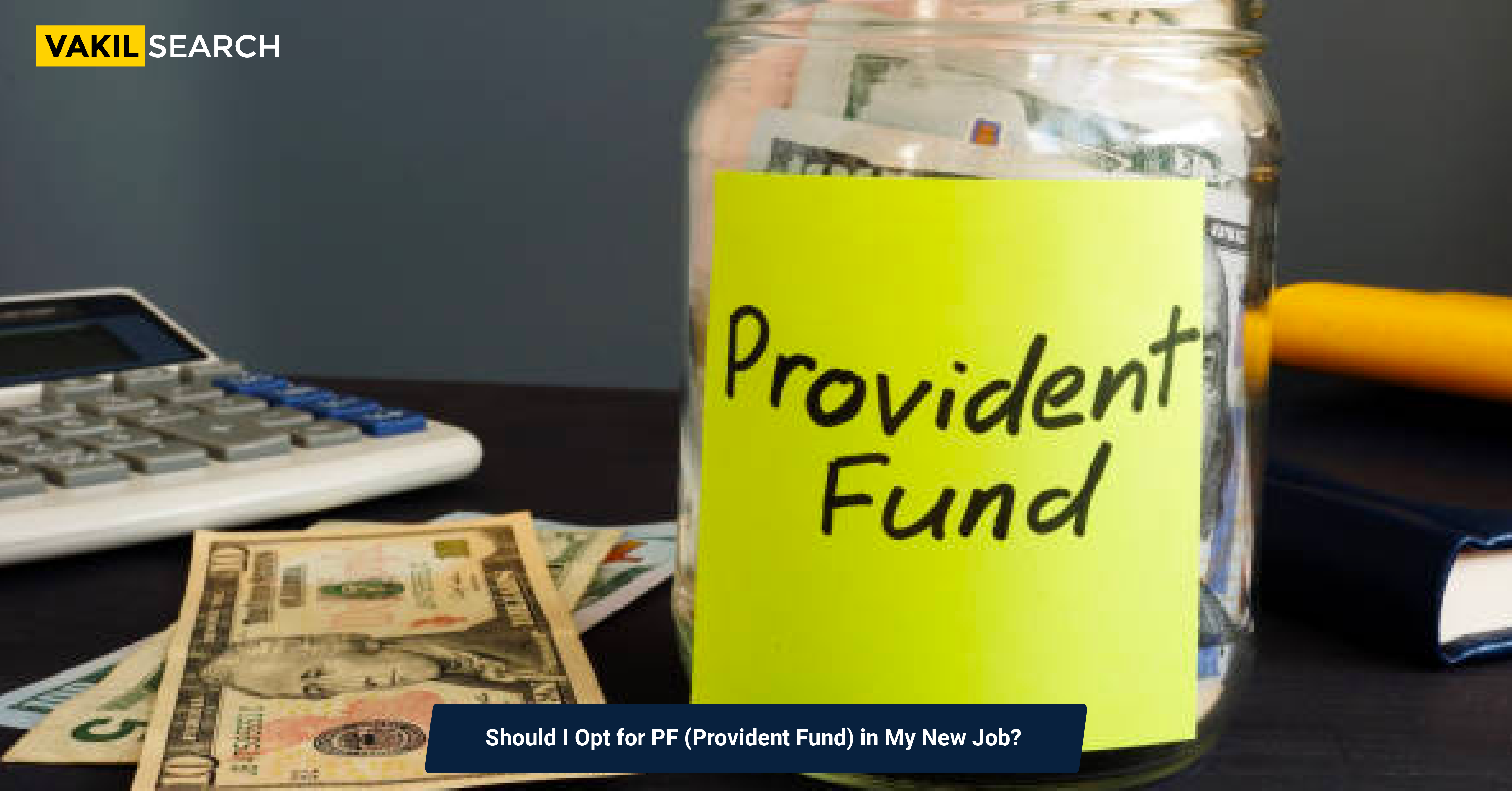This article helps you weigh the benefits and drawbacks of choosing Provident Fund in your new job.
Starting a new job is an exciting journey, but it also comes with important decisions, one of which is whether to Opt for PF (Provident Fund) in My New Job. The PF is a long-term savings scheme that can significantly impact your financial future. You Can Know more about Opt for PF (Provident Fund) in My New Job in this blog.
In this article, we’ll walk you through the factors to consider when deciding whether to enroll in PF in your new job, so you can make an informed choice. We’ll also introduce you to Vakilsearch’s ITR (Income Tax Return) services, which are designed to simplify your tax filing process.
Understanding Provident Fund (PF)
Before we dive into the decision-making process, let’s briefly understand what the Provident Fund is and how it works. The Provident Fund is a retirement savings scheme that requires both the employee and employer to contribute a portion of the employee’s salary to a dedicated account. The accumulated funds, along with interest, provide financial security during the employee’s retirement years.
Pros of Opting for PF in Your New Job
- Long-term Savings: One of the primary benefits of opting for PF is that it fosters long-term savings. By contributing a portion of your salary regularly, you build a substantial corpus for your retirement.
- Tax Benefits: PF contributions are eligible for tax deductions under Section 80C of the Income Tax Act. This can lower your taxable income and reduce your overall tax liability.
- Employer Contribution: Many employers match or partially match your PF contributions. This essentially doubles your savings rate, providing a significant financial cushion for the future.
- Financial Discipline: Enrolling in PF instills financial discipline. Since a portion of your salary is automatically deducted, you are compelled to save, which can be challenging with discretionary savings.
Cons of Opting for PF in Your New Job
- Lock-in Period: PF comes with a lock-in period, during which you cannot withdraw the funds except in specific circumstances. This lack of liquidity can be a drawback if you face unexpected financial needs.
- Low Returns: While PF offers the safety of guaranteed returns, the interest rates are typically lower compared to other investment avenues like mutual funds or stocks. This could impact your overall wealth accumulation over time.
- Limited Investment Options: PF investments are primarily restricted to debt instruments, limiting your exposure to potentially higher returns offered by equity investments.
Vakilsearch’s ITR Services: Simplify Your Tax Filing
As you contemplate your PF opt-out decision, it’s essential to ensure your tax affairs are in order. Vakilsearch offers hassle-free ITR services designed to streamline your income tax return filing process. Our experts are well-versed in tax laws and regulations, ensuring accurate and timely filings.
With Vakilsearch’s ITR Services, You Can:
- Maximize tax deductions and exemptions
- Avoid penalties and errors in your tax returns
- Stay up-to-date with changing tax laws
- Achieve peace of mind knowing your taxes are in capable hands
Conclusion: Making the Right Choice
The decision to opt for PF in your new job should align with your long-term financial goals and priorities. Consider the advantages of long-term savings, tax benefits, and employer contributions against the drawbacks of a lock-in period and potentially lower returns.
And while you’re on the path to financial clarity, don’t forget to explore Vakilsearch’s ITR services to ensure your tax obligations are met efficiently. Ultimately, your financial future is in your hands, so make the choice that best suits your aspirations and aspirations.
FAQs
Can I withdraw my PF balance when changing jobs?
Yes, you can withdraw your PF balance when changing jobs, but it's advisable to transfer it to your new employer's PF account to continue building your retirement savings.
Is it mandatory to enroll in PF in a new job?
It's not mandatory, but it's a valuable financial planning tool. You do have the option to opt out of the PF scheme, but consider the long-term benefits before making a decision.
Can I withdraw my PF balance before retirement?
You can withdraw your PF balance before retirement for certain reasons like buying a house, medical emergencies, or unemployment. However, there are rules and conditions governing such withdrawals.
Read more
- PF registration for employers
- How to Transfer PF From One Company to Another?
- Claim the final settlement using PF Withdrawal Form 19

